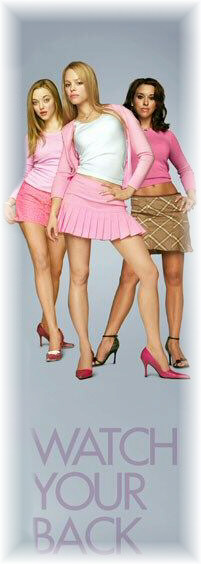 Mean to Girls
Mean to Girls
As I sat watching Mean Girls, the comedy about a new girl at high school, it occurred to me that the film was an allegory about being a newcomer to Hollywood. Like Cady Heron (winningly played by Lindsay Lohan) arriving at high school after being home schooled in Africa, Elizabeth "Tina" Fey is arriving in Hollywood after the infinitely simpler rough and tumble of Saturday Night Live. However, the real allegory, of which being a newcomer is just part, is that of becoming a woman in a patriarchal society where everyone -- girls, boys, men, women - loves to be mean to girls.
The underlying joke of the film is that the animal struggles of the Dark Continent pale beside to the daily politics of popularity at an American high school. Neither this central joke nor any of the other jokes are overplayed, and the film is surprisingly funny without becoming too predictable or too cloying. Adding relief to the narrative, for example, school buses regularly collide with students in a fairly blunt metaphor for what happens when individuals meet the socializing juggernaut of the educational process. The Gordian knot of high school complexity seems at first to be a matter of how to conform, or even to defy social Darwinism - Sarah Jessica Parker's debut in "Square Pegs" updated and upgraded - but quickly becomes the more complicated task of how to perform compassionately as a girl who is becoming a woman, despite the pressures to pass the assault down the food chain.
Cady's boundary-crossing defines her character. As the representative of a vaguely subversive comedy, Cady naturally befriends the weirdos which, in 2004, is a category defined by gender and sexual orientation. It used to be the geek who was the weirdo; now the weirdo is the queer, in Mean Girls personified by the Indychick lesbian (iconically named Janis Ian) and Damian, her "too gay to function" sidekick (given the Janis Ian moniker, one wonders if the name Damian is a deliberate reference to the Judeo-Satanic Damian of the popular 'Omen' films of the 1970s). However, as a "regulation hottie" Cady is also able to try on the mantle of the celebrity "plastics" - the superficial fashionistas who demand the focus of the dining hall crowd. Finally, as a smart girl (who plays dumb to get the guy) she is able to be one of the "Mathletes" - whose position of Maths nerds, she is assured from all sides, guarantees social oblivion. In a way, the film is a record of her rôle-playing and its resolution, but the choice of rôles that she assumes during her year all depend on her being accepted into each of these cliques because of her good looks and brains - a choice that is clearly not open to the peripheral characters in the film.
Cady begins by superimposing her understanding of the world on the scenes she sees around her. The most literal of these is when she arrives at the mall and sees it as a watering hole - a scene we are shown through her eyes. As she grows up and becomes part of adult society - forever leaving behind the photographs of her as a small girl with an elephant - she has to try on the different roles that are offered her. As she does so, she gets sucked further into this new jungle that she doesn't understand, until the imagined behaviour at the mall is replaced by real savage behaviour at school. Her actions have, with help, realized the fears of her imagination. This is a shared question of film and adolescence: through acting out our fantasies - whether of revenge or of fulfillment - will we exorcize or realize that desire?



Becoming
Jewish-ish
Jeff Leavell
How I Finally Learned to Accept Christ in my Heart
Jay Michaelson
Playing Eve
Hila Ratzabi
Hyatt Regency Dead Sea Resort
Rowena Silver
Josh Breaks his Finger
Josh Ring
Mean to Girls
Dan Friedman
Archive
Our 450 Back Pages
Saddies
David Stromberg
Zeek in Print
Spring/Summer 2004 issue now on sale!
About Zeek
News & Events
Contact Us
Tech Support
Links
From previous issues:
Run Like the Wind
Jay Michaelson and Dan Friedman
Erev
Temima Fruchter